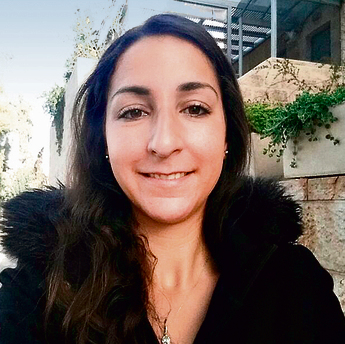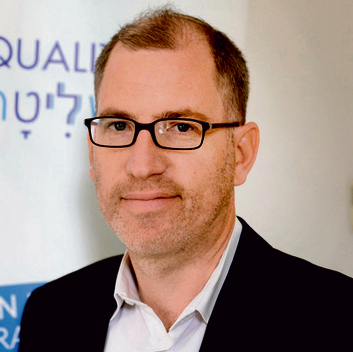
French olim struggle to practice their professions in Israel
A psychologist who sells clothes at the mall, an engineer who is forced to work in telemarketing and a certified nurse who flies to Paris every month to earn a living: Thousands of French Jews who left their native country following the rise in anti-Semitism are having trouble getting a proper job in Israel, and one-third of them don’t work at all. ‘If I don’t find a job in the coming year, I’ll consider returning to Paris,’ one of them says.
“When we started thinking about making aliyah,” he says, “we were told that the Assuta hospital was about to open in Ashdod, and people said I would have no problem getting a job there. They said the same thing to my wife, who is a surgical nurse. We were very happy. We made aliyah last July, and then we found out that it’s not a simple process. We were told that in order to get a job at Assuta we would have to pass a Health Ministry exam, as nursing certifications from France are not recognized here. In the meantime, I see Ashdod from the window of my house, and it hurts every time. I can’t understand why a person like me, who has years of experience in caring for patients, is unable to find work here.”
David is not alone. Flights leaving from Ben-Gurion Airport on Sundays and returning on Thursdays are filled with immigrants from France who are leading a similar life: As they have failed to get a job in Israel, they are forced to keep working in their native country—a phenomenon known as “Boeing Aliyah.”
“On the plane, I always meet doctors, lawyers, accountants and businesspeople who immigrated to Israel and couldn’t find a job,” David says. “It’s a very problematic arrangement: I see my children only several days a month, and I cry over the fact that they are growing up without a father. Not to mention the fact that these flights cost me several hundred dollars a month, and that’s a very big expenditure.
“I don’t want to be a millionaire, I’m not waiting for a huge salary, I’ll do just fine with NIS 6,000 a month—but I’m not even offered that. The children love living here, but I’m having a hard time with the flights and the distance. You can’t live like that for long. I work in Paris, I take many shifts, and I have no energy anymore. If I don’t find a job in Israel in the coming year, we’ll consider returning to Paris.”
His wife Rivka., 40, got a job as a nurse assistant at a Meuhedet Health Services clinic in Ashdod, but she doesn’t consider herself lucky as she would rather practice her own profession. “It really annoys me that after working as a certified nurse at a hospital in Paris for 15 years, it doesn’t count in Israel and I have to pass a Health Ministry exam as if I were a student who just graduated,” she says. “My husband tried to find work here and failed, so his job in Paris is the only choice. These trips are taking a toll on us, but it’s better than nothing.”
'Curing a fracture with a band-aid'
The couple is part of the target audience of the Employment HUB initiative, which was inaugurated in Jerusalem last week in a bid to help immigrants from France find work in Israel and cut short bureaucracy processes. Statistics show that most immigrants are in need of this kind of help: A survey initiated by Qualita, the umbrella organization for French immigrants, reveals that 65 percent of French nationals who made aliyah in the past four years are looking for help finding a job, 40 percent work in a different field from the one they worked in abroad, and 37 percent of immigrants in the working age don’t work at all.
Laura and Dan Azoulay, who immigrated to Israel from Paris last July, work here—but not in their profession. “We are both psychologists,” says 26-year-old Laura, “and when we came to Israel, we submitted our certifications and credentials to the Health Ministry to be able to practice our profession. Much to our surprise, we were turned down. They demanded that we complete our studies at a university and submit a thesis. We were astonished. My husband and I studied at good universities in France, and we couldn’t understand why it didn’t count in Israel.
“We turned to the Qualita organization, and with its help, we came to meetings with all the documents and certificates. We explained to the Health Ministry representative what we had studied in France and what was the level of our knowledge, and in February we received a license and were recognized as general psychologists. Now we have to do an apprenticeship, but we are having trouble finding a place that will take us.”
Until that happens, she is working as a saleswoman at a clothing store in a Jerusalem mall, while her husband offers consultancy services to companies in France from Israel. The couple is aware of the option of living on the Israel-France route, but won’t take it. “I see it with our friends,” Laura Azoulay says, “and in my opinion, it’s like trying to cure a fracture with a band-aid. It’s not a long-term solution. It’s bad for the family too: The husband flies to France for work, leaving his wife to deal with the new life here on her own.”
But with all the difficulties, the couple sees no option of returning to France. “I’m not even considering it. I sold an apartment and left a good job in the training department of a large finance company so that my future and my children’s future would be here. I want to be optimistic, and every morning I remind myself that I have to be very patient.”
Michael Levan, 31, who immigrated to Israel from Paris in October 2014, with a degree in materials engineering, is about to run out of patience. “Before I came here, I met with people from Israel who spoke to me about making aliyah. They told me about Israel’s high-tech companies and said I wouldn’t have a problem getting a job as an engineer. I decided to immigrate, but then I discovered that there definitely is a problem: In order to work in high-tech, you have to be a computer engineer, while there is no demand for materials engineers.”
After making aliyah, he worked in a lab at the Technion—Israel Institute of Technology, but was forced to leave and search for another job a year later due to financial trouble at the lab.
“I sent my résumé to many companies and got no response,” he says. “It was frustrating. I had to work in something to be able to eat and pay rent. I am not familiar enough with the companies in my field, and I don’t know Israelis who can connect me to them either. Although I have the knowledge, and I speak several languages, I was left without a job.”
Having no other choice, he began working in telemarketing. “I travel every morning from Haifa to Netanya and work into the night, selling solar panels for home electric systems to people in France. There are 20 French immigrants working there after failing to find a job in the field we studied. We include economists, administration and hotel workers. We have all been working in telemarketing for several years now, and it’s sad, because it’s not our profession.
“I made aliyah because of anti-Semitism. I thought I would have a good life here and work in what I like to do. Seeing that it’s not happening, I sometimes think about returning to France. I know the situation there isn’t so good for the Jews, but things aren’t very nice here either for French immigrants.”
Ariel Kandel, the CEO of the French immigrants’ umbrella organization, is well aware of the situation described by Levan. “It’s a common phenomenon,” he says. “There are dozens of centers in Israel which employ dozens and even hundreds of immigrants. These centers are legal, but when immigrants spend years in a French bubble, it’s not an ultimate absorption. We are working with the Immigrant Absorption Ministry, the Economy Ministry and the Health Ministry to help French immigrants get what they deserve and get to know how things work in Israel.”
According to Kandel, there are some 500,000 Jews in France today—mostly educated white-collar workers—and 43 percent of them say they will immigrate to Israel if the radical right rises to power. In 2015, 8,000 French Jews made aliyah; in 2016, the number dropped to 4,000, and Kandal says one of the reasons for that is the difficulty to find a job.
“Ten percent of immigrants return to France during their first three years in Israel, while the majority stays,” he says. “We can’t afford to fail in their absorption and not let them earn a living in dignity. Certified nurses, for example, should receive recognition and get a job. We are fighting to make that happen.”
Huge potential
If Kandal’s fight succeeds, 50-year-old Elizabeth Genasiyah may finally get a job. Genasiyah, a certified nurse, immigrated to Israel from Marseilles five years ago with her husband and five children. Since then, she has been sitting in her rented apartment in Jerusalem’s Har Homa neighborhood, doing nothing, and failing to understand why she is not permitted to practice her profession and take care of patients.
“If they only gave me a chance to see how I work in a hospital,” she says, “they would realize that you can’t just wipe out 20 years of experience. But they are asking me to pass a licensing test here, and it’s too difficult for me. I took the test four times and failed. At my age, it’s not easy to study academic material. It’s a shame that the Health Ministry can’t see how painful it is not being allowed to work.”
The State of Israel, apparently, has an interest in letting people like Genasiyah work. In a study conducted several months ago at Bar-Ilan University’s Economic Research Institute, Prof. Elise Brezis and Daphna Aviram-Nitzan looked into French immigrants’ contribution to the Israeli economy. “We found that the expected accumulated economic efficiency from the absorption of French immigrants in the years 2014-2026 will be reflected in an addition of some 65 billion shekels (roughly $18 billion) a year,” says Aviram-Nitzan. “The study assumed that the growth would be the result of a wave of immigration of 100,000 people from France during those years, who would integrate into the labor market and lead to a rise in the standard of living of all residents.”
Furthermore, the researchers found that the state’s income from taxes is expected to rise as well thanks to the absorption of French immigrants. “The findings indicate that the state will receive 3.7 shekels in income from taxes for every shekel it invests in encouraging and absorbing immigration, so this is a very profitable investment,” Aviram-Nitzan explains.
“But French immigrants are having a hard time here: They arrive as outsiders, they have no friends from high school or from the army, so they can’t use the ‘friend brings friend’ system. They can’t show their boss a letter of recommendation from their previous workplace either. Offering them employment support is critical for their incorporation in the Israeli labor market, as they bring a huge potential of knowledge, languages, a connection to the Western European organizational culture and familiarity with the European market.”
The immigrants, however, are finding it difficult to fulfill this potential. “In the study, we detected a major difficulty to adapt to workplaces in Israel, primarily due to language difficulties, and employers are also reluctant to hire them due to the language barrier,” the researcher says. “It’s clear to us, therefore, that they must be given proper training. The very high potential of this immigration can be realized through a very small investment.”
According to Elizabeth Genasiyah, French immigrants suffer from an unfair image. “Israelis think that all the French people immigrated to Israel to buy apartments, and that’s not the case,” she says. “Most of them sold their apartments and made aliyah. They really aren’t filthy rich. They have to work hard to put food on the table.
“In the past few months, I have been considering the possibility of travelling to Marseilles in August and working in a hospital there. In the summer, most nurses go on holiday and there is a manpower shortage there, so I might leave my children here with my husband and go work there. It will be hard on the children, but it seems like the best solution. If I didn’t have kids, I would go back to France, because how long can you suffer? A year or two maybe, but not forever.”
(Translated and edited by Sandy Livak-Furmanski)












